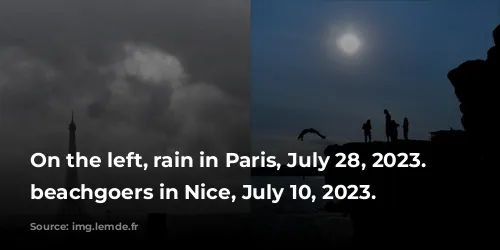This summer, the world is sizzling, but France seems to be experiencing a peculiar twist. While the Mediterranean region endures a scorching heatwave with unprecedented temperatures, the northern half of France is enjoying relatively cool weather. This paradox has sparked widespread curiosity, with some even suggesting it undermines the reality of climate change. But don’t be fooled by the cool breeze! The current situation doesn’t negate the scientific consensus about global warming; it simply highlights the intricate dance of our planet’s climate system.

Why is France Feeling a Chill?
The key to understanding France’s unexpected cool spell lies in the jet stream, a powerful river of air that circles the globe in the upper atmosphere. This year, the jet stream, which typically flows over Scandinavia during summer, has shifted southward, bringing cooler air to northern France. “It is currently located over the north of France, which explains why temperatures are cooler,” explains François Gourand, forecaster at Météo-France. As a result, France has experienced a drop in temperatures during the second half of July, enjoying a relative respite from the global heatwave.
However, it’s important to remember that France’s experience is unique. July 2023 has been the hottest month ever recorded globally, and the shift in the jet stream was not predicted due to the complexities of climate dynamics. While the El Niño phenomenon was expected to contribute to increased temperatures, short-term meteorological events like this jet stream shift can blur the long-term picture. Remember, climate refers to long-term patterns, while weather represents short-term changes.

Is This a Sign of Climate Change?
While the jet stream shift has caught some off guard, it’s too early to directly link it to climate change. Determining the link requires complex research over several summers. It’s crucial to distinguish between short-term meteorological phenomena and long-term climate change patterns. That being said, the idea that climate change is influencing the jet stream’s behavior cannot be ruled out.
Climate disruption can affect pressure and temperature contrasts, which in turn influence the jet stream’s movement. A 2022 study by the University of Pennsylvania suggests that climate change is indeed causing changes in the jet stream’s behavior, making it more prone to shifting latitude, as seen this summer. This means that while the jet stream shift is a short-term event, its occurrence within the context of a warming planet raises a red flag.

Is France Experiencing a Cool Summer?
While the northern part of France is experiencing a cooler summer, it’s not accurate to declare the entire country cool. The south of France, especially Corsica, has been subject to intense heatwaves, with temperatures reaching record highs. In fact, July has been the 15th hottest month for France as a whole since 1900. Additionally, while France may not experience a heatwave between now and August 15, temperatures are expected to rise again after that.
But it’s not just about heatwaves. The changing climate also brings more frequent and intense episodes of extreme weather, including heavy storms and torrential rain. While the overall amount of precipitation in France might remain similar, its distribution is shifting. Instead of a gradual drizzle, we’re seeing more concentrated bursts of heavy rain, showcasing another facet of the climate change story.

The Mediterranean Under Fire
While France experiences a mixed bag of weather, the Mediterranean region is facing a full-blown heatwave. Italy, Greece, Turkey, and North Africa are suffering through record-breaking temperatures, with readings exceeding 48 degrees Celsius in some areas. This extreme heat has sparked devastating wildfires in Greece, Croatia, Portugal, and Bulgaria, emphasizing the catastrophic consequences of climate change.
Although the Mediterranean region is known for hot summers, the frequency and intensity of these heatwaves are unprecedented. These events are a stark reminder of the potential future of our climate, with increasingly intense and frequent heat waves. The current heatwave is so severe that scientists believe it’s similar to what we might expect around 2050, highlighting the urgent need to address climate change.

The Oceans: A More Reliable Climate Indicator
Looking at local weather patterns can be misleading, as short-term events can mask long-term climate trends. One of the most reliable indicators of global warming is ocean temperatures. Oceans absorb a significant amount of heat from the atmosphere, and unlike air, they retain this heat for longer, making them a more stable indicator of climate change. In recent months, the Mediterranean Sea and the North Atlantic have reached unprecedented temperature levels, firmly confirming the reality of global warming.
While France might be enjoying a temporary reprieve from the global heatwave, the summer of 2023 is a sobering reminder of the impact of climate change. The paradoxical weather patterns underscore the complex nature of our climate system, but the evidence of global warming is undeniable. We must look beyond short-term weather fluctuations and focus on the long-term trends that point to a planet in dire need of our attention and action.









